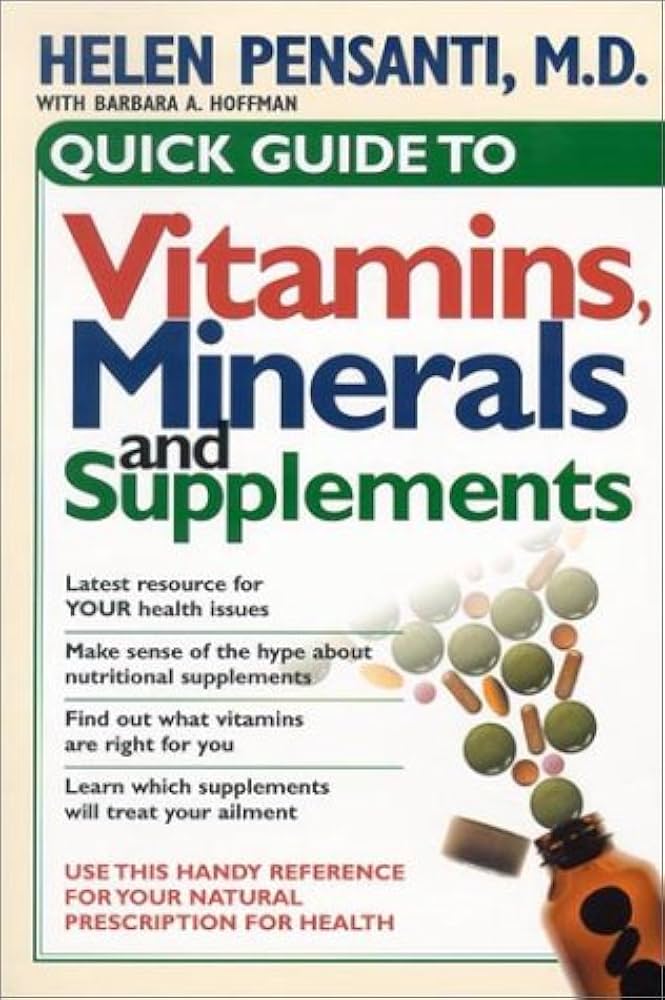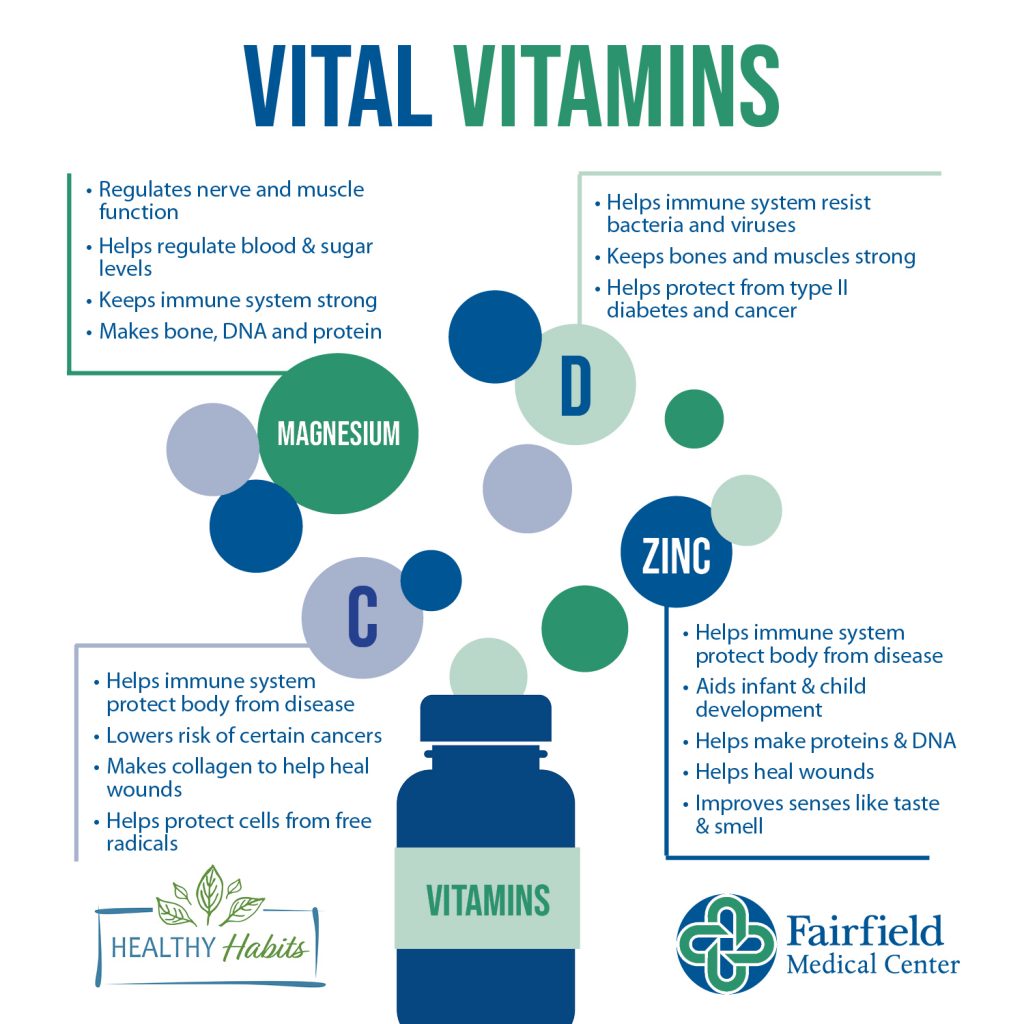Welcome to the ultimate guide to vitamins and minerals! In this informative article, we will delve into the importance of these essential nutrients and how they contribute to our overall health and well-being. By understanding the functions, sources, and benefits of vitamins and minerals, you can make informed choices to meet your nutritional needs. Whether you are looking to boost your immune system, improve bone health, or address deficiencies, this guide will provide you with valuable insights and practical tips for incorporating these nutrients into your diet. So let’s get started and unlock the secrets to a healthier life!
Importance of Vitamins and Minerals

Vitamins and minerals are vital for maintaining good health and are essential for various bodily functions. They play a crucial role in supporting growth, development, and overall well-being. These nutrients are involved in important processes such as energy production, immune function, bone health, and cell repair. Without an adequate intake of vitamins and minerals, deficiencies can occur, leading to a range of health problems. By incorporating a variety of nutrient-rich foods into your diet, you can ensure that you are getting the necessary vitamins and minerals to support your body’s needs and maintain optimal health.
Benefits of essential vitamins
Essential vitamins are crucial for your overall health and well-being. Each vitamin has its own set of benefits that contribute to different bodily functions. Vitamin A promotes healthy vision and skin, while Vitamin C boosts your immune system and protects against common illnesses. B vitamins, like B12 and folate, are essential for energy production and brain function. Vitamin D supports strong bones and teeth, and Vitamin E acts as a powerful antioxidant, protecting your cells from damage. Incorporating a variety of foods rich in essential vitamins can help you maintain optimal health and prevent deficiencies.
Role of minerals in the body

Minerals play a vital role in maintaining various bodily functions. They are essential for strong bones and teeth, nerve function, muscle contractions, and fluid balance. Some important minerals include calcium, iron, magnesium, and potassium. Calcium is crucial for bone health, while iron is important for oxygen transport and energy production. Magnesium supports over 300 enzyme reactions in the body, and potassium helps maintain proper heart and muscle function. Including a variety of minerals in your diet is essential for overall health and wellness.
Vitamin A

Vitamin A is an essential nutrient for maintaining good vision, especially in dim light. It also helps in the growth and development of cells, including those in the immune system. You can get Vitamin A from various sources such as carrots, sweet potatoes, spinach, and liver. A deficiency in Vitamin A can lead to night blindness, dry skin, and weakened immunity. Including foods rich in Vitamin A in your diet ensures optimal health and supports your immune system.
Functions and sources of Vitamin A

Vitamin A plays a crucial role in maintaining good vision, particularly in low-light conditions. It also supports the growth and development of cells, including those in the immune system. You can obtain Vitamin A from a variety of sources such as carrots, sweet potatoes, spinach, and liver. These foods are rich in beta-carotene, which is converted into Vitamin A in the body. Including these Vitamin A-rich foods in your diet ensures optimal eye health and supports your immune system.
Signs of Vitamin A deficiency

If your body lacks Vitamin A, you may experience a range of symptoms. One of the most common signs of Vitamin A deficiency is night blindness, where it becomes difficult to see in dim light or at night. You may also suffer from dry eyes and have difficulty maintaining proper vision. In severe cases, Vitamin A deficiency can lead to xerophthalmia, a condition that causes dryness, ulcers, and even blindness. It is important to ensure that you include Vitamin A-rich foods in your diet to avoid these symptoms and maintain good eye health.
Vitamin C

Vitamin C is a powerful antioxidant that plays a crucial role in maintaining good health. It is essential for the production of collagen, which is responsible for healthy skin, cartilage, and blood vessels. Vitamin C also supports the immune system, making it vital for fighting off infections and promoting faster healing. Include citrus fruits, strawberries, kiwi, and leafy greens in your diet to ensure an adequate intake of this important nutrient. Remember, Vitamin C is water-soluble, so it is important to consume it regularly since the body cannot store it.
Benefits and sources of Vitamin C

Vitamin C is known for its numerous health benefits. It is an essential nutrient that plays a vital role in boosting the immune system, fighting off infections, and promoting faster healing. Vitamin C is also a powerful antioxidant, which helps protect cells from damage caused by free radicals.
Some excellent sources of Vitamin C include citrus fruits like oranges and grapefruits, strawberries, kiwi, and leafy green vegetables such as broccoli and spinach. Including these foods in your diet regularly will ensure you receive an adequate intake of this important nutrient.
Importance of Vitamin C for immunity

Vitamin C plays a crucial role in boosting your immune system. It helps stimulate the production of white blood cells, which are essential for fighting off infections and viruses. Vitamin C also enhances the function of these cells by improving their ability to attack and eliminate harmful pathogens. Additionally, this powerful antioxidant helps reduce inflammation in the body, preventing chronic diseases and promoting overall well-being. Including Vitamin C-rich foods in your diet is key to maintaining a strong immune system and preventing illnesses. So, make sure to add citrus fruits, berries, and leafy green vegetables to your daily meals.
Iron

Iron is an essential mineral that plays a vital role in your body. It is responsible for the production of hemoglobin, which helps carry oxygen to your cells and tissues. Consuming iron-rich foods like lean meats, beans, and dark green leafy vegetables is crucial to prevent iron deficiency anemia. Common symptoms of iron deficiency include fatigue, weakness, and pale skin. Make sure to include iron in your diet to support your energy levels and maintain overall health.
Role of iron in the body

Iron plays a crucial role in your body by helping produce hemoglobin, the protein in red blood cells that carries oxygen to all parts of your body. It is also involved in energy production and supports the immune system. Iron helps maintain healthy metabolism, promotes brain function, and assists in muscle formation and growth. It is important for maintaining healthy hair, skin, and nails. Ensuring an adequate intake of iron is essential for optimal health and overall well-being.
Symptoms of iron deficiency

Iron deficiency can lead to several symptoms that can affect your overall health and well-being. Here are some common signs of iron deficiency to watch out for:
- Fatigue and weakness: Lack of iron in the body can lead to decreased energy levels and constant feelings of tiredness.
- Pale skin and nail beds: Iron deficiency can cause a pale complexion and brittle nails.
- Shortness of breath: A low iron count can affect the body’s capacity to carry oxygen, leading to shortness of breath even during mild physical activities.
- Dizziness and headaches: Insufficient iron levels can disrupt normal blood circulation, resulting in dizziness and frequent headaches.
- Unusual cravings for non-food items: Known as pica, iron deficiency can cause the urge to eat substances like ice, dirt, or clay.
If you experience any of these symptoms, it is essential to consult a healthcare professional for proper diagnosis and treatment.
Calcium

Calcium is an essential mineral that plays a vital role in maintaining the health of our bones and teeth. It also helps in blood clotting, muscle contraction, and nerve function. Incorporating calcium-rich foods like dairy products, leafy greens, and fortified cereals into your diet is crucial to ensure you meet your daily calcium needs. Adequate calcium intake is especially important during childhood and adolescence, as well as for older adults to prevent osteoporosis. Consider speaking with a healthcare professional to determine if calcium supplements are necessary to meet your specific needs.
Sources and benefits of calcium

To ensure you’re getting enough calcium in your diet, include foods like dairy products, leafy greens (such as kale and spinach), fortified cereals, and fortified plant-based milk alternatives. Calcium is crucial for maintaining healthy bones and teeth, but it also plays a role in blood clotting, muscle contraction, and nerve function. Children and adolescents need adequate calcium for proper growth and development, while older adults can benefit from calcium to prevent osteoporosis. For personalized advice, consult a healthcare professional.
Impact of calcium on bone health

Calcium plays a vital role in maintaining strong and healthy bones. Your bones are constantly undergoing a process of breakdown and rebuilding, and calcium is necessary for this process. When your body doesn’t get enough calcium from your diet, it starts to take calcium from your bones, leading to weakened bones over time. This can increase your risk of fractures and osteoporosis, especially as you age. By ensuring an adequate intake of calcium, you can support your bone health and reduce the risk of bone-related issues.
Conclusion of Guide to Vitamins and Minerals

In conclusion, vitamins and minerals play a crucial role in maintaining overall health and well-being. Each vitamin and mineral has unique functions that are essential for the body. By ensuring a balanced diet rich in these nutrients, you can support your immune system, promote healthy bodily functions, and reduce the risk of deficiencies and related health issues. Additionally, while it’s best to obtain vitamins and minerals from whole foods, supplements can be a convenient way to meet your nutritional needs. Remember to consult with a healthcare professional before starting any new supplements. Take care of your body by nourishing it with the necessary vitamins and minerals it needs to thrive.
Creating a balanced diet with vitamins and minerals

A balanced diet that includes a variety of fruits, vegetables, whole grains, lean proteins, and healthy fats is key to ensuring an adequate intake of vitamins and minerals. Aim to incorporate a rainbow of colorful fruits and vegetables into your meals to provide a range of nutrients. Opt for whole grains such as brown rice, oats, and quinoa to increase your intake of B vitamins and minerals like magnesium and selenium. Including lean proteins such as poultry, fish, beans, and tofu will help meet your iron and zinc requirements. Lastly, adding sources of healthy fats like nuts, seeds, avocados, and olive oil can enhance the absorption of fat-soluble vitamins like A, D, E, and K. Don’t forget to hydrate well and limit processed foods that are often low in essential nutrients. By following these guidelines, you can create a balanced diet that fuels your body with the necessary vitamins and minerals it needs to thrive.
Tips for supplementing nutrients in your diet

To ensure you are getting all the necessary vitamins and minerals, consider incorporating supplements into your diet. However, it is important to consult with a healthcare professional before starting any supplementation. They can help determine which specific nutrients you may be lacking and recommend the appropriate supplements. Additionally, try to choose high-quality supplements from trusted brands. Remember, supplements are meant to supplement a balanced diet, not replace it. So, continue to focus on eating a variety of nutrient-rich foods to meet your body’s needs.
For More Blogs visit Aerns

